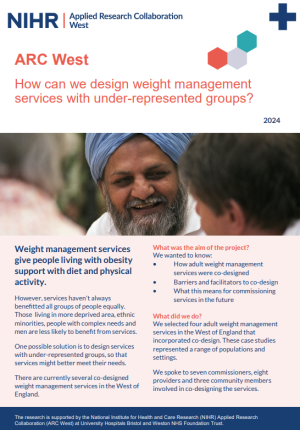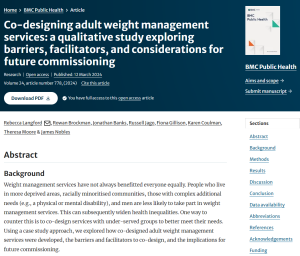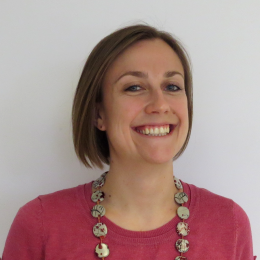How can we design weight management services with under-represented groups?
Weight management services give people living with obesity support with diet and physical activity. The services aim to help people be healthier and manage their weight. The services are often run by public health teams in councils or by the NHS.
Weight management services haven’t always benefitted all groups of people equally. People who are less likely to take part in a weight management service include:
- Those who live in more deprived areas
- People from an ethnic minority group
- Those with complex additional needs, such as a physical or mental disability
- Men
As a result, such services can increase health inequalities rather than reduce them.
One possible solution is to design services with under-represented groups, so that services might better meet their needs. Designing services together in this way is called ‘co-design’.
There are several co-designed weight management services in the West of England. We wanted to explore how these services were co-designed with community members.
This research project was led by NIHR ARC West in collaboration with local NHS and local authority partners.
Project aims
We wanted to know:
- How adult weight management services were co-designed
- Barriers and facilitators to co-design
- What this means for commissioning services in the future
What we did
We selected four adult weight management services in the West of England that incorporate co-design. These case studies represented a range of populations and settings.
We gave our case study services the following pseudonyms:
- Healthy Choices – originally planned to target racially-minoritised communities
- FitnFun – working with adults with mild learning disabilities
- Active People – targeting areas of high deprivation and racially-minoritised communities
- The Men’s Project – working with men
We spoke to seven commissioners, eight providers and three community members involved in co-designing the services.
The case studies used a range of co-design activities from light-touch to more in-depth approaches.
What we found and what this means
Participants across all four services saw the potential benefits of co-designing weight management services with community members.
They felt co-design could:
- Create more suitable services
- Reach populations traditionally excluded from mainstream services
- Increase engagement
However, they also saw co-design as challenging and needing significant time and effort.
Building relationships
Building strong relationships was seen as critical to co-design.
It took time and effort to build the trust and credibility needed for successful co-design. This was done in different ways:
- Partnering with a well-respected local voluntary organisation (Men’s Project)
- Commissioning a private company (Active People)
- Using in-house local authority resources (Healthy Choices, FitnFun)
You can’t just go in and “do” co-production… It takes groundwork. You have to build all these relationships to do it well.
Funding for co-design
Funding for co-design was often short-term and unpredictable. Two services were unable to implement all their co-design plans because the timeframe was too short or government funding was pulled at the last minute.
Participants noted this unpredictability could damage relationships with communities.
Communities have been hit by the “hit-and-run”, people saying we’re going to do this… then a month later they’re gone.
Evidence, effectiveness and evaluation
Some commissioners were concerned with the lack of an evidence base for co-design. In the context of tight budgets, they wondered if public money would be better spent on well-evidenced national programmes. Other commissioners felt their current approach was not working and they needed to try something new.
Are we better spending a huge amount on one [co-designed] group and we don’t know how effective it is, compared to less on a wider group where we know the results are reasonable?
Evaluating co-designed services and building the evidence base was challenging. Short-term funding made it hard to build in rigorous evaluation.
But a wider issue related to what outcomes should be assessed. For example, the Men’s Project was funded as a weight management project but, being fully “co-created”, the men chose its focus.
Their priorities were more about loneliness, mental health and building community, than weight loss. The commissioner of this project felt it created “the context that enables people to make choices around their weight at a later date” but recognised it posed challenges for evaluation.
Would I say it was a success? Yes, but that’s taking new perspective on what success is. If I presented this to a board of clinicians or NHS England, would they say it was successful? I don’t know!
Commissioning for ‘true’ co-design
Some participants felt current commissioning practices – which focused on “Key Performance Indicators, bums on seats, people through the door” – did not fit easily with the flexibility needed for co-design.
Some participants felt commissioning for co-design required “a change in mindset and culture”, as well as “courage” and a willingness to embrace uncertainty. Finding the right partners to work with – those who shared your ethos and values around co-design – was seen as critical.
As a commissioner you think you know what you want to come out of it, and it might not be that. If you’re truly going to do co-creation… it demands flexibility and openness… which is not a traditional commissioner role, allowing for that uncertainty and emergence.
What next?
Drawing on our analysis, we identified key considerations (PDF) for those wanting to co-design health services:
Build relationships
- Connect with communities
Consider partnering with local voluntary organisations, commissioning private companies or using in-house resources - Develop shared values
Discuss your values, what you hope to achieve and how you will build a shared vision for co-design with partners - Strengthen relationships
Establish trust, rapport and credibility with communities – an essential part of co-design. It will take time and can’t be rushed
Create supportive organisational cultures
- Get comfortable with uncertainty
Co-design involves uncertainty. Stakeholders may see issues in different ways. Co-design should focus on the most important outcomes to community members - Reflect on commissioning practices
Consider how you might commission to produce longer-term ‘value’ rather than focusing on short-term, pre-specified outcomes - Think about the long game
Short-term or unreliable funding hinders meaningful co-design and can damage relationships with communities
Develop the evidence base
- Share the successes and the failures
Use evaluation approaches that capture the subtle, long-term and upstream impacts of co-design
ARC BITE

How can we design weight management services with under-represented groups
Download the BITEPaper

Co-designing adult weight management services: a qualitative study exploring barriers, facilitators, and considerations for future commissioning
Read the paperLead collaborators
- Karen Coulman, University of Bristol
- James Nobles, Leeds Beckett University
ARC West Staff
Dr Rowan Brockman
Senior Research AssociateLauren Scott
Senior Research Associate, Quantitative Research/Evidence SynthesisDr Carlos Sillero Rejon
Research Fellow, Health EconomicsProfessor Frank de Vocht
Applied Data Sciences Team Co-leadProfessor Russ Jago
Co-Theme Lead, Public HealthPartners on this project
University of Bath
The University of Bath is one of the UK's leading universities with an international reputation for quality research and teaching. Its mission is to deliver world class research and teaching, educating its graduates to become future leaders and innovators, and benefiting the wider population through our research, enterprise and influence.
University of Bristol
The University of Bristol is internationally renowned and one of the very best in the UK, due to its outstanding teaching and research, its superb facilities and highly talented students and staff. Its students thrive in a rich academic environment which is informed by world-leading research. It hosts the Elizabeth Blackwell Institute for Health Research.





